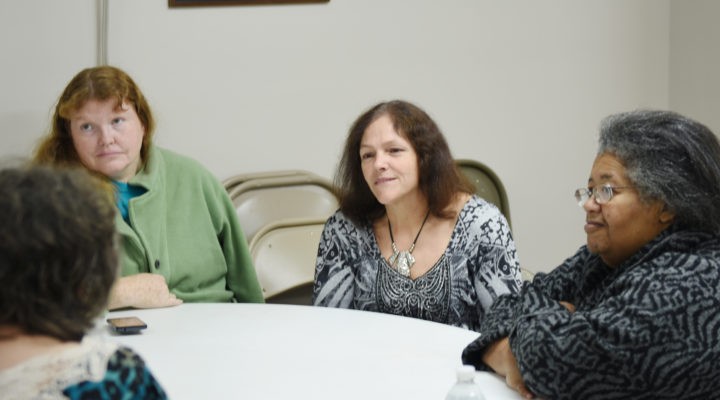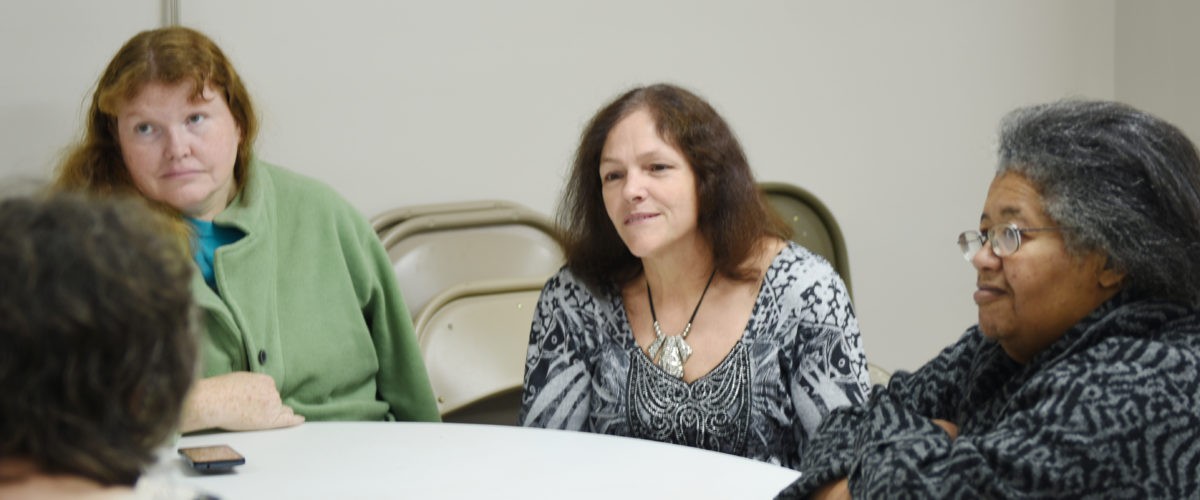I had no business showing up at Mountain Moms’ Wednesday meeting. But on my first morning in Lake Cumberland, Kentucky, I was passenger to Scarlette Jasper, a friend these women trust with their lives — women, mind you, who have been scarred by abuse and tried by the trappings of rural Appalachia.
Summer’s green profusion had not quite relinquished its hold on the south Kentucky hills, despite the frost lingering on Scarlette’s Prius as we pulled into the parking lot of Saint Peter Catholic Church. I sat for a moment, basking in the greenhouse effect, and swallowed a tinge of apprehension. I was undoubtedly one of the only men ever to visit Mountain Moms, a group formed precisely to heal the wounds that men have inflicted on their wives, their girlfriends, their mothers, even. What reason did they have to trust me with their stories?
I closed the passenger door, shouldered my camera gear and trusted the only reason I had: Scarlette. I followed her into the cold shadow of the sanctuary and down a set of concrete steps to the basement. Sister Anne Kernan, Mountain Moms’ facilitator, greeted us warmly at the door and led us into a dim, fluorescent gathering hall, where four women circled around a speckled plastic table. A lone icon hung on the wall above them, a gold-leafed Madonna cradling her child and keeping watch over her kindred mothers — Janice, Connie, Jennifer and Priscilla. Who else but a young woman, terrified yet courageous in the face of violence, could be their matron saint?
Scarlette approached the table and heartily greeted her friends. I followed close behind, making equally tender yet skeptical introductions. Mountain Moms was supposed to host their monthly lunch outing that afternoon, but Sister Anne caught a stomach virus, so their schedule was clear. I swung a metal folding chair out from under the table and paused for permission to join the conversation.
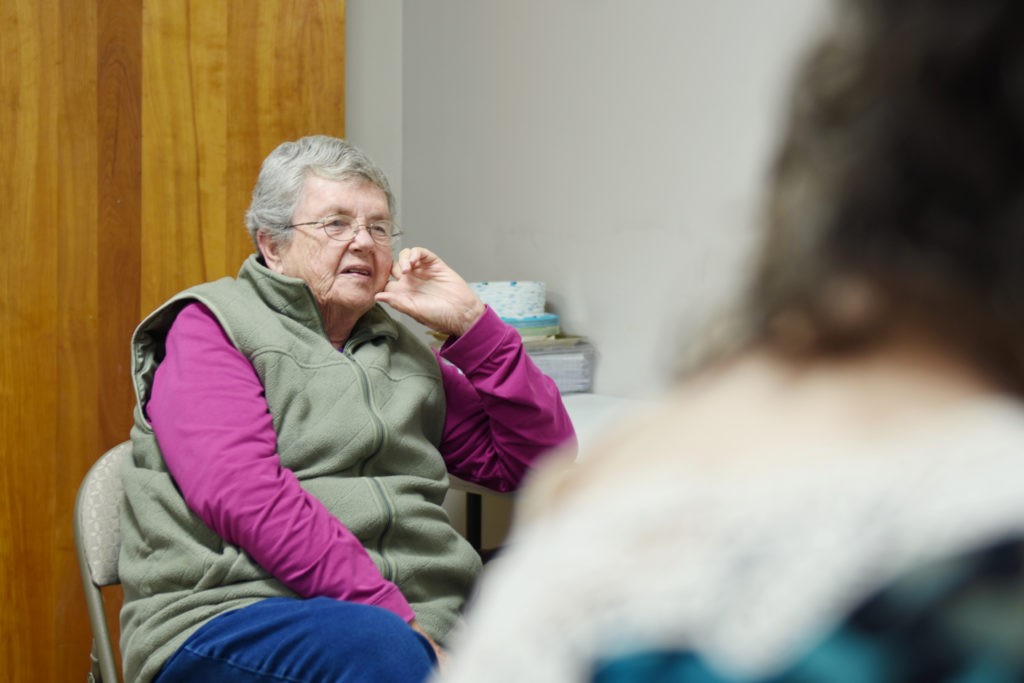
Sister Anne Kernan helped found the Mountain Moms support group in Monticello, Kentucky, nearly three decades ago.
Photo by Blake Tommey.
“We don’t bite,” Janice exclaimed, as I took a seat and cozied up to the table.
“Janice does,” Connie quipped in my left ear, “if you don’t watch her.”
“Well, she might nibble a little bit,” Scarlette echoed from behind the table.
Connie resumed her goosing. “Depends on how hungry she is.”
“I’m gonna get you,” Janice fired back.
“You can see part of what we do,” Connie said, gradually sobering her tone. “Just be silly.”
“We’re a support group for women and we help each other with whatever we need,” she continued. “Because our lives have similar backgrounds, we have a lot of things in common. Most of us have children, and most of us with adult children have had to deal with the drug situation in Wayne County and the lack of jobs. So we’re able to support each other. When something is going on in your life, you have people to talk to.”
Indeed, these mountain moms have each other, as well as their facilitator Sister Anne, but they also have Scarlette Jasper, field personnel with Together for Hope, the Cooperative Baptist Fellowship’s rural development coalition. For years, Scarlette has supported Mountain Moms with everything from budget counseling and nutrition workshops to federal benefit assistance and deliverance from domestic violence.
But titles mean nothing to Scarlette. Using them would only hinder her in flowing seamlessly between helper and receiver, a powerful ally and a woman who, at the end of the day, requires the same love and tending as anyone at the table.
“So would you be willing to tell me about the journeys that led you here?” I asked expectantly. “What experiences do you have in common?”
“The drug situation in Monticello,” Janice murmured softly.
“Troubles,” Jennifer declared from across the table.
Janice offered some elaboration. “Some of us have man troubles, some of us have kid troubles.”
“Some of us have had both,” Connie explained.
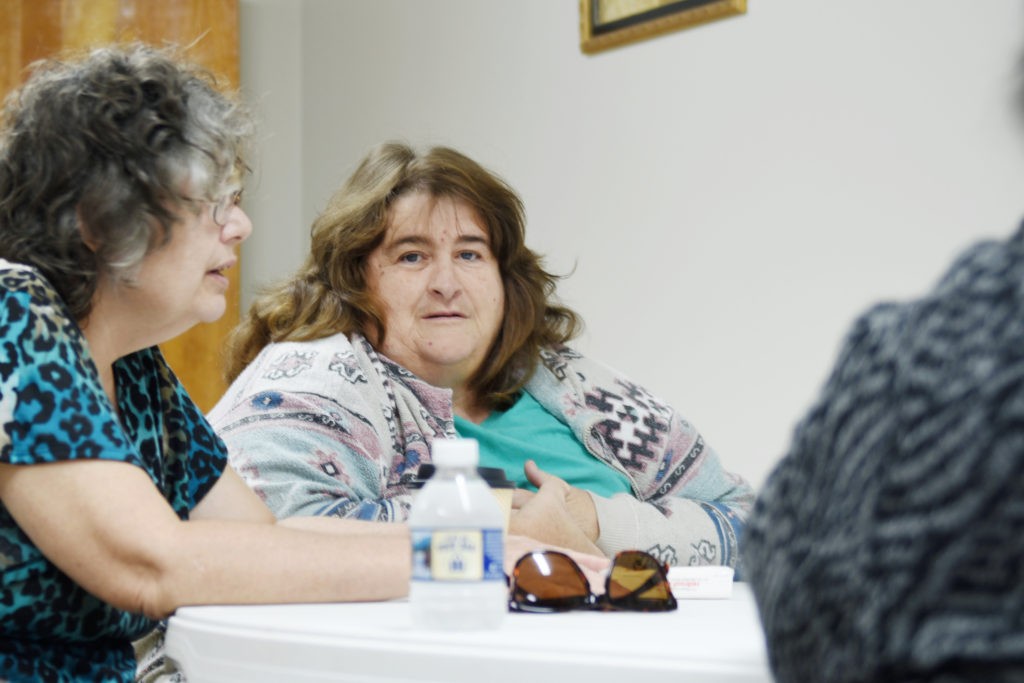
Priscilla has been attending Mountain Moms for 26 years, their longest-committed participant.
Photo by Blake Tommey.
Indeed, Connie’s journey to Mountain Moms began with a toxic mixture of both. Eleven years ago, she endured the most difficult day of her life when she filed an emergency protection order against her son, who had taken up his father’s mantle as Connie’s verbal and physical abuser.
“Oh lord, I was renting at the time but I had an adult abusive son who was basically tearing my house down, I mean horrible,” she explained, stifling her tears. “It was a horrible time in my life, and I called Scarlette all the time just to cry on her shoulder, even when I didn’t need to know about the legal process. She was always there for me.”
Sister Anne jutted her arm into the circle, extending a tissue over Connie’s shoulder.
“She’s always got my back. She’s on it,” Connie said, peppering her sobs with laughter.
“We do for each other here,” Sister Anne said with a wink.
“Well, she knows I’m a cry baby,” Connie explained.
As if legally restraining her son wasn’t enough, Connie was forced to flee her apartment with nowhere to go. That’s when Scarlette, an experienced housing counselor, stepped in to offer more than a shoulder on which to cry.
“A lot of the individuals I work with, not just here but in other areas, need help with housing and trying to navigate that process,” Scarlette explained. “We have resources but they’re not well advertised, so people don’t know what steps to take. Plus, many programs require you to apply online and it’s helpful to have someone navigate the process with you.”
Together, Connie and Scarlette navigated multiple assistance programs to secure a new home, including a matched savings IDA, or individual development account, which helps victims of domestic violence build their savings toward a specific goal, such as a vehicle or new home. Every dollar Connie saved, the Kentucky Coalition Against Domestic Violence would match it with two, thereby tripling her investment. By the time her down payment was due, Connie had personally saved $2,000 and subsequently put $6,000 down on her new house.
Better yet, Connie qualified for a specialized program of the Kentucky Housing Corporation, which pays her monthly mortgage installments in full, given she continues to deposit at least $10 a month into her IDA.
“It’s amazing,” Connie declared, “especially considering where I was when all of this started. I can’t believe it. It’s totally amazing.”
“The programs that I work through, they require some buy-in,” Scarlette said. “It’s a partnership. We walked together. Didn’t we Connie?”
“Yes,” Connie whispered, bowing her head.
“Would anybody else be willing to share what brought you here?” I asked. “Priscilla?”
“Well, ‘Scilly, you’re the one who was here first,” Jennifer said.
Priscilla responded timidly.
“My sister always brought me,” she said. “I came through her. Then I met her and her, playing games and talking.”
“Priscilla was here the second week we were open,” Sister Anne interjected, “26 years ago.”
“And I had two little kids then, too,” Priscilla added.
Two little kids and no husband. He was killed in a car accident, leaving Priscilla to raise her two children alone. Since then, she and her sister Mary have leaned on and supported Mountain Moms through their grief and struggle.
A few years later, Priscilla remarried and had a third child, a daughter who just turned 21 and now lives in Nicholasville, Kentucky. Ultimately, Priscilla said, being with people, especially her family at Mountain Moms, makes her feel whole again.
“What about you, Jennifer?” I asked. “Are you willing to share what brought you here?”
“Well, I met Sister Anne when my daughter was little,” Jennifer explained. “My baby girl’s daddy left, and left me to take care of her and me handicapped.”
Her answer needed no explanation, even to a brand-new acquaintance. As a young woman, Jennifer contracted bone cancer and survived only after surgeons amputated her left arm at the shoulder. Consequently, she was forced to leave her job at a local sewing factory. Having already faced the death of her first husband, Jennifer endured physical abuse from her daughter Lily’s father until he vanished.
“I was tore up because I thought I loved him,” she said matter-of-factly. “And well, I was so tore up that I didn’t know if I could go on or not. The lady that came to help me at the HANDS program [Health Access Nurturing Development Services] got in touch with Sister Anne and she came to see me. That’s how I got to know her and she invited me.”
Jennifer soon found more kindred company in Connie, whose mother she worked alongside at the sewing factory. That led to a decade and counting with Mountain Moms, she said, as she continues to care for Lily, now 12 years old.
“We’ve literally watched each other’s kids grow up,” Connie said.
“My child, let’s see, how old was Charlie?” Janice interjected. “Three? Four?”
“And how old is Charlie now?” Scarlette inquired.
“22,” Janice replied.
Connie reprised her goosing. “Janice, you’re getting old.”
“Y’all been telling me that for years,” Janice replied, laughing. She promptly squared her face to mine and signaled to the swaths of gray hair protruding from her forehead. “This is earned, dear.”
“You don’t put that in?” I joked.
“Nope,” she said, smiling proudly.
“Well, do you feel open to sharing your journey to Mountain Moms, Janice?”
She pursed her lips and paused for a solid five seconds of contemplation. “Well, why not?”
“I met Scarlette,” she said, pausing for more contemplation. “She helped me apply for SSI.”
That’s Supplemental Security Income, for laity, which provides monthly payments to older or disabled individuals with low-income and few resources.
“And after a long struggle,” Sister Anne said emphatically.
“Yeah, she helped me with a child I’m trying to give away,” Janice teased.
Scarlette helped translate the inside joke. “Sometimes they don’t want to leave home, or they leave home and they come back.”
“They come back and they bring more with them,” Connie added.
Though Janice did endure domestic violence as a younger woman, her most recent abuse took an infinitely more complex form, namely in her son, Charlie, and his friends, many of whom were battling drug addiction and yet made themselves frequent house guests at Janice’s home. As her guests’ income began to lag behind their addiction, they took to stealing her belongings and debit card, even draining her checking account.
It wasn’t long before Janice’s landlord caught wind of her overcrowded apartment — a gross violation of her lease — and evicted her. Janice had nowhere to go but to her sister’s house, where she lived until she regained her feet. Meanwhile, Scarlette coached Janice through protecting her income and belongings from further theft. More importantly, however, Scarlette helped her apply for SSI, a convoluted process with which even the most educated and able need assistance, she explained.
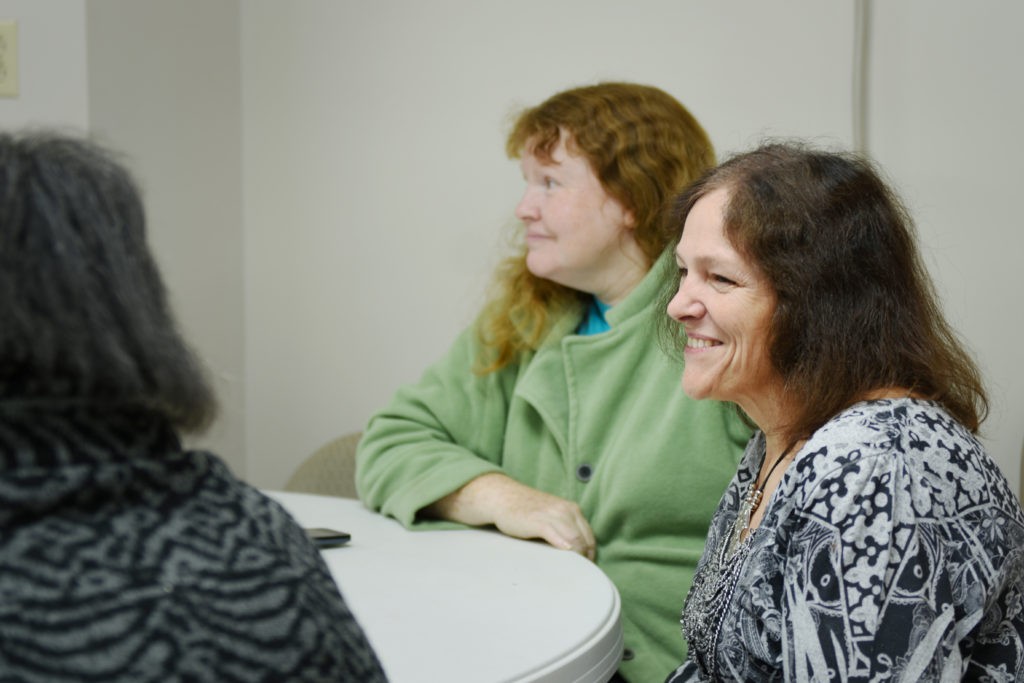
The Mountain Moms receive support from each other as well as through their partner Scarlette Jasper, field personnel with Together for Hope.
“A big thing I do is help individuals apply for social security benefits, SSI or SSDI. I go through filing the paperwork. I’ve been trained to do that — everything up to if they get denied and we have to file an appeal. Then we go get an attorney. Just helping get that process started, because if you go to the Social Security office, they just tell you, ‘There’s a computer in the lobby.’
“It’s very lengthy to do all of that paperwork, and everything has to be done online now. So I consult and help with eligible benefits, benefits that they deserve and are qualified for, whether it’s housing, food benefits, SSI or SSDI, different things like that.”
“I don’t know how Scarlette does as much as she does,” Sister Anne bellowed, turning to Scarlette across the table. “I don’t know how you do it, girl.”
“She did say that she’s a workaholic,” I blurted out in response.
Scarlette muffled a laugh. “I did tell him I’m a workaholic.”
“And her supervisor gets onto her, she said, for not taking her vacation days,” I blurted out again.
As the laughter died, Scarlette tilted her head to the floor. “But you know,” she said, “when you get to be with people like the ladies in this room, that’s not work. That’s a blessing for me.”
I took the opportunity to share my own gratitude. “Thank you so much for having me, for telling me your stories and letting me in. I know that’s not an easy thing to do and I know that I’m a strange person. I can’t tell you how much I appreciate you.”
“If Scarlette trusts you, you’re okay with us,” Connie declared, as the others laughed with her.
“Right, yes, that’s good. I’m glad she’s here,” I replied, chuckling through my teeth.
Scarlette continued. “These ladies are my family too, and they have been for a long time. They minister to each other and they minister to me much more than I minister to them. I don’t know that they realize that.
“I want you all to know that,” she said. “Sometimes we may have something planned and it just doesn’t go that way, does it? But we just end up talking and being together.”
Connie nodded her head in agreement. “Those are usually the best days.”
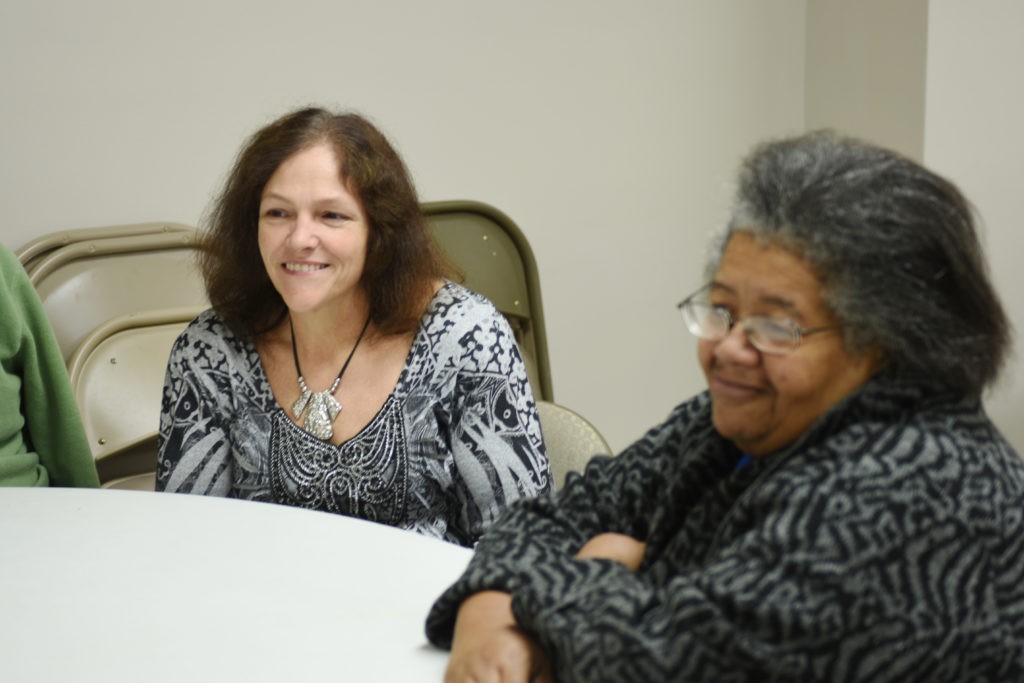
Through mentorships, many pertaining to financial health, Scarlette Jasper helps empower people struggling with low income, including Janice, a member of the Mountain Moms support group for survivors of abuse.
Read more in the Southeast Kentucky series:
Living in poverty is hard work
Terrified yet courageous in the face of violence, Mountain Moms survive together
Southeast Kentucky: Enduring images
Photo Gallery: Southeast Kentucky
Video: Scarlette Jasper reflects on the compassion of a family in need
Video: Scarlette Jasper Reinterprets Rural Poverty
Video: What makes Glynda Jackson angry?
Video: Tamara Daffron finds stability through financial health mentorship
Related commentary at baptistnews.com:
Our disaster-relief success hasn’t moved the needle in addressing poverty. We need to ask why | Craig Nash
Reimagining churches as full-time partners with those in poverty | Laura Rector
Related news at baptistnews.com:
Interfaith partnerships, service to those in poverty and an ATM define Louisiana church
The endless work of combatting rural poverty can leave you in the dark, but hope flickers
This series in the “Resilient Rural America” project is part of the BNG Storytelling Projects Initiative. Has the United States forgotten its countryside? What strength and resilience may yet be stirring outside our city limits? In “Resilient Rural America,” we attempt to answer these questions when we visit these unique communities to examine the singular nature of poverty in rural America and tell the stories of development among its courageous and resilient people.
_____________
Seed money to launch our Storytelling Projects initiative and our initial series of projects has been provided through generous grants from the Christ Is Our Salvation Foundation and the Eula Mae and John Baugh Foundation. For information about underwriting opportunities for Storytelling Projects, contact David Wilkinson, BNG’s executive director and publisher, at [email protected] or 336.865.2688.

